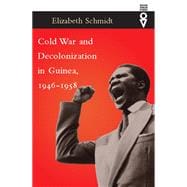
Note: Supplemental materials are not guaranteed with Rental or Used book purchases.
Purchase Benefits
What is included with this book?
| List of Illustrations | p. ix |
| Abbreviations | p. xi |
| French Colonial Officials, 1944-59 | p. xiii |
| Introduction | p. 1 |
| Reformed Imperialism and the Onset of the Cold War, 1945-50 | p. 8 |
| The Break with the PCF and Dissension within the Ranks, 1950-53 | p. 45 |
| The Fraudulent Elections of 1954 and the Resurgence of the RDA, 1954-55 | p. 68 |
| The RDA's Rise to Power and Local Self-Government, 1956-57 | p. 97 |
| The Renaissance of the Left: From Autonomy to Independence, 1956-58 | p. 125 |
| Defiance and Retribution: The Referendum and Its Aftermath, 1958-60 | p. 157 |
| Conclusion and Postscript | p. 180 |
| Acknowledgments | p. 187 |
| Notes | p. 191 |
| Bibliography | p. 283 |
| Index | p. 293 |
| Table of Contents provided by Ingram. All Rights Reserved. |
The New copy of this book will include any supplemental materials advertised. Please check the title of the book to determine if it should include any access cards, study guides, lab manuals, CDs, etc.
The Used, Rental and eBook copies of this book are not guaranteed to include any supplemental materials. Typically, only the book itself is included. This is true even if the title states it includes any access cards, study guides, lab manuals, CDs, etc.